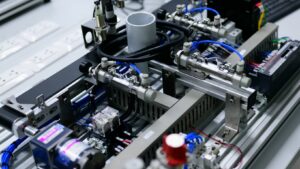Key Takeaways
- Core Concepts: The book emphasizes three fundamental concepts of operating systems: virtualization, concurrency, and persistence, which are essential for understanding system functionality.
- Virtualization Benefits: Virtualization allows multiple operating systems to operate on a single physical machine, optimizing resource utilization and increasing flexibility.
- Concurrency Management: Effective concurrency management enhances multitasking efficiency by permitting simultaneous execution of multiple processes or threads, resulting in better system responsiveness.
- Importance of Persistence: Persistence ensures data integrity across sessions, allowing reliable storage and retrieval, crucial for applications that require data durability.
- Career Advancement: Knowledge of operating systems and their principles is vital for technology-related careers, enhancing problem-solving abilities and positioning professionals favorably in the job market.
- Accessible Learning Resource: “Operating Systems: Three Easy Pieces” simplifies complex topics, making it an ideal resource for learners of all levels seeking to deepen their understanding of operating systems.
Operating systems are the backbone of modern computing, managing hardware resources and providing essential services for applications. “Operating Systems: Three Easy Pieces” breaks down this complex subject into digestible parts, making it accessible for both beginners and seasoned developers.
This resource emphasizes three core concepts: virtualization, concurrency, and persistence. By exploring these foundational elements, readers gain a clearer understanding of how operating systems function and interact with hardware. Whether you’re a student diving into computer science or a professional looking to refresh your knowledge, this guide offers valuable insights that can enhance your grasp of operating systems.
Operating Systems Three Easy Pieces
 “Operating Systems: Three Easy Pieces” breaks down the complex topic of operating systems into three fundamental concepts: virtualization, concurrency, and persistence. Each concept plays a crucial role in how operating systems function and manage resources.
“Operating Systems: Three Easy Pieces” breaks down the complex topic of operating systems into three fundamental concepts: virtualization, concurrency, and persistence. Each concept plays a crucial role in how operating systems function and manage resources.
Virtualization enables the creation of virtual instances of hardware resources. It allows multiple operating systems to run concurrently on a single physical machine. This optimizes resource utilization and enhances flexibility. Examples include virtual machines and container-based architectures.
Concurrency refers to the ability of an operating system to manage multiple tasks simultaneously. It involves executing multiple processes or threads at the same time. This concept is vital for maximizing efficiency in multitasking environments. Examples include process scheduling and thread management.
Persistence
Persistence ensures data remains intact across sessions. It allows data to be stored and retrieved even after a program terminates. This concept involves the use of various storage mechanisms, such as file systems and databases. Examples include saving user data and application state.
Overall, “Operating Systems: Three Easy Pieces” serves as an essential resource for understanding these fundamental concepts. It effectively guides readers through the workings of operating systems, making the subject approachable for learners at all levels.
Key Concepts Covered in the Book
“Operating Systems: Three Easy Pieces” delves into three foundational concepts of operating systems: virtualization, concurrency, and persistence. Each plays a crucial role in the functionality of modern computing systems.
Virtualization
Virtualization refers to creating virtual instances of hardware resources. It facilitates running multiple operating systems simultaneously on a single physical machine. This approach enhances resource utilization by allowing independent environments, such as virtual machines, to operate concurrently. Virtualization optimizes hardware resource management and increases flexibility in deploying applications, making it a vital aspect of modern computing environments.
Concurrency
Concurrency encompasses the management of multiple tasks at the same time within an operating system. This capability is essential for efficient multitasking, permitting several processes to run without interference. Concurrency improves system responsiveness and resource allocation. Various techniques, such as threads and processes, enable an operating system to prioritize tasks, ensuring optimal performance across applications.
Persistence
Persistence involves maintaining data integrity across program sessions. It ensures that data remains accessible even after a program terminates or the system restarts. Through mechanisms like file systems and databases, persistence allows users to store and retrieve information reliably. This concept is critical in application development, as it contributes to data durability and enhances user experience.
Importance of Understanding Operating Systems
 Understanding operating systems is crucial for several reasons. Operating systems act as intermediaries between hardware and software, enabling smooth communication. They manage hardware resources, ensuring efficient operation and access for applications.
Understanding operating systems is crucial for several reasons. Operating systems act as intermediaries between hardware and software, enabling smooth communication. They manage hardware resources, ensuring efficient operation and access for applications.
Knowledge of operating systems enhances problem-solving skills. Developers can troubleshoot issues related to resource allocation or task management effectively. Mastery of concepts like virtualization, concurrency, and persistence leads to better application performance and user experience.
Awareness of operating systems fosters innovation. Designers can create applications that leverage system capabilities, improving functionality. Understanding how operating systems utilize resources drives better design choices and optimizes applications.
Familiarity with operating systems is vital for career advancement in technology-related fields. Knowledge of these systems positions professionals favorably in a competitive job market. Employers value candidates who grasp operating system principles, enhancing team productivity.
The insights gained from “Operating Systems: Three Easy Pieces” simplify complex topics. This resource clarifies how operating systems function, making it accessible for learners at all levels. It serves as a foundation for further exploration in computing and software development.
Review of Each Section
The book “Operating Systems: Three Easy Pieces” dives into critical components of operating systems. Each section elaborates on essential principles that optimize system functionality and enhance application performance.
Detailed Analysis of Virtualization
Virtualization creates virtual instances of hardware resources, allowing for multiple operating systems to run on a single physical machine. This method maximizes resource utilization and flexibility. Examples of virtualization technologies include hypervisors, which manage and allocate resources to various operating systems. The section emphasizes the role of abstraction, where complex hardware details become invisible to users, simplifying interactions and promoting efficiency in resource management.
Insights on Concurrency Management
Concurrency management focuses on executing multiple tasks simultaneously, enhancing system efficiency and responsiveness. The section discusses processes and threads as fundamental units of concurrency. Processes are isolated execution environments, while threads share memory space but operate independently. This design enables optimal resource allocation and performance in multitasking environments. Techniques like synchronization and scheduling ensure an orderly execution of tasks, preventing conflicts and maintaining system stability.
Exploring Persistence Techniques
Persistence techniques guarantee data integrity across sessions, allowing for seamless storage and retrieval. The section details methods for achieving persistence, such as file systems and databases. File systems organize data on storage devices, while databases provide structured data management. The discussion also includes the importance of ensuring data consistency and durability, vital for user experience and application reliability. Emphasis lies on the need for robust data management strategies to enhance application functionality.
Virtualization
Understanding operating systems is crucial for anyone involved in computing. The concepts of virtualization concurrency and persistence provide a solid framework for grasping how these systems function. By mastering these principles individuals can enhance their problem-solving skills and improve application performance.
“Operating Systems: Three Easy Pieces” offers an accessible entry point into this complex subject. It empowers readers to leverage operating system capabilities in their projects and fosters innovation in application development. As technology continues to evolve the knowledge of operating systems will remain a valuable asset for developers and tech professionals alike.

